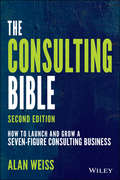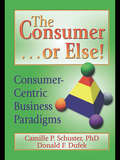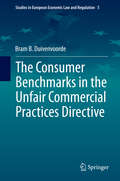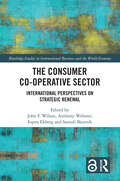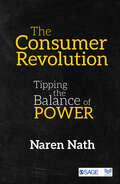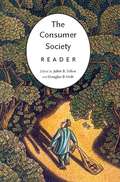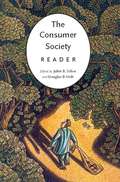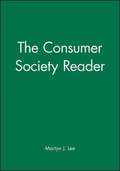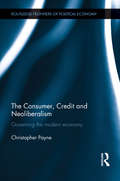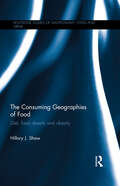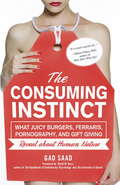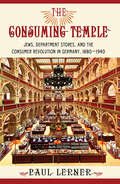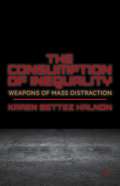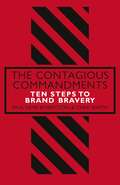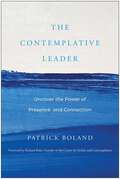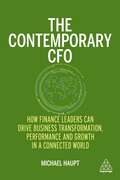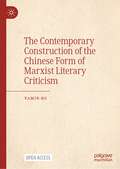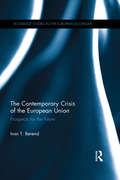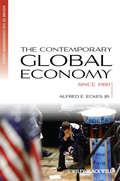- Table View
- List View
The Consulting Bible: How to Launch and Grow a Seven-Figure Consulting Business
by Alan WeissThe new edition of bestselling real-world guide to consultancy success, from the “Rock Star of Consulting” Alan Weiss The second edition of The Consulting Bible: Everything You Need to Know to Create and Expand a Seven-Figure Consulting Practice remains the most comprehensive and practical guide to the consulting profession, from launch to high growth, from marketing to implementation. Legendary consultant, speaker, and bestselling author Alan Weiss shows you how to create an independent or boutique consulting practice and take it to seven-figure success. Step-by-step, this invaluable resource guides you through attracting clients, maximizing your value, and achieving your career goals. In the decade since the first publication of The Consulting Bible, an array of significant developments has dramatically impacted the consulting profession: shifts in social consciousness, the Covid-19 pandemic, tele-consulting and virtual meetings, the globalization of the economy, the growth of social media, and many more. This exhaustively revised new edition provides specific approaches and techniques for mastering the new consulting environment and turning volatility and disruption into unlimited opportunities. Designed to help you become the authority and expert that organizations turn to again and again, this book is your one-stop resource for: Building a strong global brand that draws people to you Marketing remotely to reduce costs and allow for higher fees Mastering the latest implementation techniques Forging strong relationships with the buyers of a new generation Selecting the consulting methodology that best fits your requirements Writing proposals and creating testimonials and references Using advanced technology to sell and deliver your services Written for newcomers and veterans alike, The Consulting Bible: Everything You Need to Know to Create and Expand a Seven-Figure Consulting Practice, Second Edition, is essential reading for every solo consultant, entrepreneur, and principal of a small consulting firm.
The Consumer . . . or Else!: Consumer-Centric Business Paradigms
by Donald F Dufek Camille P Schuster"The customer is the only one who can fire all of us." -Sam Walton Doing business in today's economy and surviving requires a new paradigm. Who are at the center of this new approach to doing business? CONSUMERS. Historically, power struggles have raged between suppliers and distributors. Recently, both parties awakened to the fact that neither of them has the ultimate power . . . it now resides solely with the consumer. This valuable book describes what demassification of the consumer market means and will show you how-and why-businesses must adapt to succeed. Handy charts, tables, and illustrations make the information easy to understand, and fascinating sidebar quotations from well-known leaders of various industries-Sam Walton, Jack Welch, and many more-give the book a unique and memorable flavor. "Consumers," say the authors, "not only demand higher quality and lower prices, but also expect convenient, quick, customized service. They expect in-stock conditions and quality. They demand value and respect. Global markets mean large numbers of consumers, but these consumers want to be treated as individuals, and the mass market no longer exists. Companies in industries from financial services to groceries to consumer goods to health care to hardware to automobiles are adopting these new business processes and winning in the marketplace. Their competitors are falling by the wayside." This essential book: examines the factors that are shaping the current business environment and looks at the re-orientation of today's consumer, presenting global perspectives on these vital issues explores this new consumer-centric approach from the perspectives of suppliers, intermediaries, and retailers, as well as the business processes being used to create more efficient supply chains and more effective demand fulfillment processes shows you the tools that can be used to implement this new business paradigm in the areas of technology, internal business processes, and collaboration answers frequently asked questions shares the success stories of Rite Aid, Southwest Airlines, Starbucks, Snap-On Tools, National Semiconductor, and others! After addressing the issues of why business must change and examining the significance of a global business environment, The Consumer . . . or Else! addresses each element of the new business paradigm: the new role of consumers major players, including the shift in the business processes of retailers and manufacturers and the role of intermediaries new business processes, with a focus on technology, internal coordination, and collaboration Companies from Dell Computer to Del Monte are putting consumers first and reaping the sales benefits. General Mills will soon provide consumers with the opportunity to create and name their own custom cereal. As the authors point out, "The business process is changing-changing the way product flows, the way information flows, and the way cash flows. Companies that recognize this need to change will hold huge competitive advantages, and the companies that fail to adapt will simply not be here in the future." Let The Consumer . . . or Else!: Consumer-Centric Business Paradigms be your guidebook to this challenging new business climate.
The Consumer Benchmarks in the Unfair Commercial Practices Directive
by Bram B. DuivenvoordeThis book investigates the regime of consumer benchmarks in the Unfair Commercial Practices Directive and explores to what extent this regime meets each of the goals of the Directive. In particular, it assesses whether the consumer benchmarks are suitable in terms of achieving the three goals of the Directive: achieving a high level of consumer protection, increasing the smooth functioning of the internal market, and improving competition in the market as such. In addition to providing a thorough analysis of the consumer benchmarks and their relationship to the goals of the Directive, at a more practical level, the book provides insight into the working and consequences of the benchmarks that can be used in the evaluation of the Unfair Commercial Practices Directive and its application by the CJEU. This assessment is important because the Directive, while promising to regulate unfair commercial practices in a way that achieves the Directive's goals, has removed the possibility for Member States to regulate unfair commercial practices themselves.
The Consumer Co-operative Sector: International Perspectives on Strategic Renewal (Routledge Studies in International Business and the World Economy)
by John F. Wilson Anthony Webster Espen Ekberg Samuli SkurnikGlobally, consumer co-operation has experienced a difficult period since the 1970s. Large scale failures in France, Germany and Austria were accompanied by loss of market share in the UK (including the failure of the Scottish Co-operative Wholesale Society and its takeover by its English counterpart). Even in the Nordic countries, where consumer co-operation has always been more robust, new challenges from the non-co-operative sector had to be confronted. How did co-operative organizations in different countries cope with these challenges? What were the processes of strategic renewal that they undertook? How successful were they? These are the key questions that the collection will address, culminating in an analysis by the editors of the effectiveness of strategic renewal in the co-operative sector. This book is a study of strategic renewal in the consumer co-operative sector, using eleven international case-studies to demonstrate how the concept has been applied over the last fifty years.
The Consumer Co-operative Sector: International Perspectives on Strategic Renewal (Routledge Studies in International Business and the World Economy)
by John F. Wilson Anthony Webster Espen Ekberg Samuli SkurnikGlobally, consumer co-operation has experienced a difficult period since the 1970s. Large scale failures in France, Germany and Austria were accompanied by loss of market share in the UK (including the failure of the Scottish Co-operative Wholesale Society and its takeover by its English counterpart). Even in the Nordic countries, where consumer co-operation has always been more robust, new challenges from the non-co-operative sector had to be confronted. How did co-operative organizations in different countries cope with these challenges? What were the processes of strategic renewal that they undertook? How successful were they? These are the key questions that the collection will address, culminating in an analysis by the editors of the effectiveness of strategic renewal in the co-operative sector. This book is a study of strategic renewal in the consumer co-operative sector, using eleven international case-studies to demonstrate how the concept has been applied over the last fifty years.
The Consumer Revolution: Tipping the Balance of Power
by Naren NathIn this ground breaking book, Naren Nath provides a sweeping narrative of revolutions since the dawn of human civilization, leading up to the current and most impactful of them all—the consumer revolution. The book paints a gripping picture of consumers melding together, akin to nuclear fusion, to unleash unprecedented amount of energy and creativity, setting in motion a stunning transfer of power from traditional institutions. In doing so, it tosses up myriad new business ideas, and also highlights some of the sinister implications if the revolution is not harnessed correctly. The Consumer Revolution provides a fascinating context and rationale for some of the biggest current events and trends around the world. It is a stirring call for action to billions of everyday consumers to express their will and wield power in this ultimate doctrine of consumer empowerment.
The Consumer Society Reader
by Juliet Schor D. B. HoltThe Consumer Society Reader features a range of key works on the nature and evolution of consumer society. Included here is much-discussed work by leading critics such as Jean Baudrillard, Susan Bordo, Dick Hebdige, bell hooks, and Janice Radway. Also included is a full range of classics, such as Frankfurt School writers Adorno and Horkheimer on the Culture Industry; Thorstein Veblen's oft-cited writings on "conspicuous consumption"; Betty Friedan on the housewife's central role in consumer society; John Kenneth Galbraith's influential analysis of the "affluent society"; and Pierre Bourdieu on the notion of "taste.""Consumer society--the 'air we breathe,' as George Orwell has described it--disappears during economic downtruns and political crises. It becomes visible again when prosperity seems secure, cultural transformation is too rapid, or enviornmental disasters occur. Such is the time in which we now find ourselves. As the roads clog with gas-guzzling SUVs and McMansions proliferate in the suburbs, the nation is once again asking fundamental questions about lifestyle. Has 'luxury fever,' to use Robert Frank's phrase, gotten out of hand? Are we really comfortable with the 'Brand Is Me' mentality? Have we gone too far in pursuit of the almighty dollar, to the detriment of our families, communities, and natural enviornment? Even politicians, ordinarily impermeable to questions about consumerism, are voicing doubts... [and] polls suggest majorities of Americans feel the country has become too materialistic, too focused on getting and spending, and increasingly removed from long-standing non-materialist values." -From the introduction by Douglas B. Holt and Juliet B. Schor
The Consumer Society Reader
by Juliet Schor D. B. HoltThe Consumer Society Reader features a range of key works on the nature and evolution of consumer society. Included here is much-discussed work by leading critics such as Jean Baudrillard, Susan Bordo, Dick Hebdige, bell hooks, and Janice Radway. Also included is a full range of classics, such as Frankfurt School writers Adorno and Horkheimer on the Culture Industry; Thorstein Veblen's oft-cited writings on "conspicuous consumption"; Betty Friedan on the housewife's central role in consumer society; John Kenneth Galbraith's influential analysis of the "affluent society"; and Pierre Bourdieu on the notion of "taste.""Consumer society--the 'air we breathe,' as George Orwell has described it--disappears during economic downtruns and political crises. It becomes visible again when prosperity seems secure, cultural transformation is too rapid, or enviornmental disasters occur. Such is the time in which we now find ourselves. As the roads clog with gas-guzzling SUVs and McMansions proliferate in the suburbs, the nation is once again asking fundamental questions about lifestyle. Has 'luxury fever,' to use Robert Frank's phrase, gotten out of hand? Are we really comfortable with the 'Brand Is Me' mentality? Have we gone too far in pursuit of the almighty dollar, to the detriment of our families, communities, and natural enviornment? Even politicians, ordinarily impermeable to questions about consumerism, are voicing doubts... [and] polls suggest majorities of Americans feel the country has become too materialistic, too focused on getting and spending, and increasingly removed from long-standing non-materialist values." -From the introduction by Douglas B. Holt and Juliet B. Schor
The Consumer Society Reader
by Juliet B. Schor Douglas B. HoltThis books features a range of key discussions about consumer society. Included are much-discussed work by leading ritics such as Jean Baudrillard, Susan Bordo, Dick hebdige, bell hooks, and Janice Radway. Also included are a full range of classics, such as Frankfurt School writers Adorno and Horkheimer on the Culture Industry; Thorstein Veblen's oft-cited writings on "conspicuous consumption"; Betty Friedan on the housewife's central role in consumer society; John K. Galbraith's influential analysis of the "affluent society"; and Pierre Bourdieu on the notion of "taste".
The Consumer Society Reader
by Douglas B. Holt Juliet SchorThe Consumer Society Reader features a range of key works on the nature and evolution of consumer society. Included here is much-discussed work by leading critics such as Jean Baudrillard, Susan Bordo, Dick Hebdige, bell hooks, and Janice Radway. Also included is a full range of classics, such as Frankfurt School writers Adorno and Horkheimer on the Culture Industry; Thorstein Veblen's oft-cited writings on "conspicuous consumption"; Betty Friedan on the housewife's central role in consumer society; John Kenneth Galbraith's influential analysis of the "affluent society"; and Pierre Bourdieu on the notion of "taste.""Consumer society--the 'air we breathe,' as George Orwell has described it--disappears during economic downtruns and political crises. It becomes visible again when prosperity seems secure, cultural transformation is too rapid, or enviornmental disasters occur. Such is the time in which we now find ourselves. As the roads clog with gas-guzzling SUVs and McMansions proliferate in the suburbs, the nation is once again asking fundamental questions about lifestyle. Has 'luxury fever,' to use Robert Frank's phrase, gotten out of hand? Are we really comfortable with the 'Brand Is Me' mentality? Have we gone too far in pursuit of the almighty dollar, to the detriment of our families, communities, and natural enviornment? Even politicians, ordinarily impermeable to questions about consumerism, are voicing doubts... [and] polls suggest majorities of Americans feel the country has become too materialistic, too focused on getting and spending, and increasingly removed from long-standing non-materialist values." -From the introduction by Douglas B. Holt and Juliet B. Schor
The Consumer Society Reader
by Martyn J. LeeThe Consumer Society Reader is the most substantial collection of classic and contemporary readings on consumption and consumer society for students of cultural studies and sociology of culture. From Karl Marx to Jean Baudrillard, the volume introduces students and researchers to the topics, themes, and preoccupations of twentieth-century consumer culture.
The Consumer, Credit and Neoliberalism: Governing the Modern Economy (Routledge Frontiers Of Political Economy Ser. #152)
by Christopher PayneThis book is an investigation into the economic policy formulation and practice of neoliberalism in Britain from the 1950s through to the financial crisis and economic downturn that began in 2007-8. It demonstrates that influential economists, such as F.A. Hayek and Milton Friedman, authors at key British think tanks such as the Institute of Economic Affairs and the Centre for Policy Studies, and important political figures of the Thatcher and New Labour governments shared a similar conception of the consumer. For neoliberals, the idea that consumers were weak in the face of businesses and large corporations was almost offensive. Instead, consumers were imagined to be sovereign agents in the economy, whose consumption decisions played a central role in the construction of their human capital and in the enabling of their aspirations. Consumption, just like production, came to be viewed as an enterprising and entrepreneurial activity. Consequently, from the early 1980s until the present day, it was felt necessary that banks should have the freedom to meet the borrowing needs of consumers. Credit rationing would be a thing of the past. Just like businesses, consumers and households could use debt to expand their stock of personal assets. By utilizing the method of French philosopher Michel Foucault this book provides an original analysis of the policy ideas and political speeches of key figures in the New Right, in government and at the Bank of England. And it addresses the key question as to why policy-makers both in Britain and the United States did little or nothing to stem rising consumer and household indebtedness, instead always choosing to see increasing house prices and homeownership as a positive to be encouraged.
The Consuming Geographies of Food: Diet, Food Deserts and Obesity (Routledge Studies of Gastronomy, Food and Drink)
by Hillary J. ShawThe consumption and distribution of food, as well as its production, has become a major public policy issue over the past few decades; what we eat is no longer merely a private matter but carries significant externalities for wider society. Its increasing significance within the public arena implies a dissonance regarding the boundaries of food; where do we draw the line between food as private and food as public? What are the rights of society to impinge upon individual food consumption, and what conflicts will ensue when this boundary is disputed? The Consuming Geographies of Food explores these multiple issues of food across different regions of the world from the consumer’s perspective. It uniquely explicates the factors that lead customers towards certain typologies of consumption and towards certain types of retailing, offering a comprehensive review of the obesity problem, the phenomenon of food deserts and the issue of exclusion from a healthy diet. It then considers the effects of food on the consumer, the dynamic relationship between food and people, and the issue of food exclusion before concluding with possible futures for food consumption, from low-technology projects to high-technology scenarios. Based on original research into food access, ethics and consumption in both developed and less-developed countries this book will be of interest to students, researchers and academics in the fields of geography, economics, hospitality health, marketing, nutrition and sociology.
The Consuming Instinct
by David M. Buss Gad SaadIn this highly informative and entertaining book, the founder of the vibrant new field of evolutionary consumption illuminates the relevance of our biological heritage to our daily lives as consumers. While culture is important, the author shows that innate evolutionary forces deeply influence the foods we eat, the gifts we offer, the cosmetics and clothing styles we choose to make ourselves more attractive to potential mates, and even the cultural products that stimulate our imaginations (such as art, music, and religion). The book demonstrates that most acts of consumption can be mapped onto four key Darwinian drives--namely, survival (we prefer foods high in calories); reproduction (we use products as sexual signals); kin selection (we naturally exchange gifts with family members); and reciprocal altruism (we enjoy offering gifts to close friends). The author further highlights the analogous behaviors that exist between human consumers and a wide range of animals.For anyone interested in the biological basis of human behavior or simply in what makes consumers tick--marketing professionals, advertisers, psychology mavens, and consumers themselves--this is a fascinating read.From the Hardcover edition.
The Consuming Instinct
by Gad SaadFor anyone interested in the biological basis of human behavior or simply in what makes consumers tick--marketing professionals, advertisers, psychology mavens, and consumers themselves--this is a fascinating read.What do all successful fast-food restaurants have in common?Why are women more likely to become compulsive shoppers and men more likely to become addicted to pornography?How does the fashion industry play on our innate need to belong?Why do men's testosterone levels rise when they drive a Ferrari or a Porsche?The answer to all of these intriguing questions is "the consuming instinct," the underlying evolutionary basis for most of our consumer behavior. In this highly informative and entertaining book, the founder of the vibrant new field of evolutionary consumption illuminates the relevance of our biological heritage to our daily lives as consumers. While culture is important, the author shows that innate evolutionary forces deeply influence the foods we eat, the gifts we offer, the cosmetics and clothing styles we choose to make ourselves more attractive to potential mates, and even the cultural products that stimulate our imaginations (such as art, music, and religion). This book demonstrates that most acts of consumption can be mapped onto four key Darwinian drives--namely, survival (we prefer foods high in calories); reproduction (we use products as sexual signals); kin selection (we naturally exchange gifts with family members); and reciprocal altruism (we enjoy offering gifts to close friends). The author further highlights the analogous behaviors that exist between human consumers and a wide range of animals.
The Consuming Temple: Jews, Department Stores, and the Consumer Revolution in Germany, 1880–1940
by Paul LernerDepartment stores in Germany, like their predecessors in France, Britain, and the United States, generated great excitement when they appeared at the end of the nineteenth century. Their sumptuous displays, abundant products, architectural innovations, and prodigious scale inspired widespread fascination and even awe; at the same time, however, many Germans also greeted the rise of the department store with considerable unease. In The Consuming Temple, Paul Lerner explores the complex German reaction to department stores and the widespread belief that they posed hidden dangers both to the individuals, especially women, who frequented them and to the nation as a whole.Drawing on fiction, political propaganda, commercial archives, visual culture, and economic writings, Lerner provides multiple perspectives on the department store, placing it in architectural, gender-historical, commercial, and psychiatric contexts. Noting that Jewish entrepreneurs founded most German department stores, he argues that Jews and “Jewishness” stood at the center of the consumer culture debate from the 1880s, when the stores first appeared, through the latter 1930s, when they were “Aryanized” by the Nazis. German responses to consumer culture and the Jewish question were deeply interwoven, and the “Jewish department store,” framed as an alternative and threatening secular temple, a shrine to commerce and greed, was held responsible for fundamental changes that transformed urban experience and challenged national traditions in Germany’s turbulent twentieth century.
The Consumption of Inequality: Weapons of Mass Distraction
by Karen Bettez HalnonThe fads, fashions, and media in popular consumer culture frequently make recreational and ideological "fun" of poverty and lower class living. In this book, Halnon delineates how incarceration, segregation, stigmatization, cultural and social consecration, and carnivalization work in the production and consumption of inequality.
The Contagious Commandments: Ten Steps to Brand Bravery
by Paul Kemp-Robertson Chris BarthContagion may alarm doctors but marketers thrive on it. Some concepts are so compelling you have to share them. But what makes an idea so infectious you can't keep it to yourself? And how can brands produce these kinds of ideas intentionally rather than by chance?Contagious, the globally renowned intelligence resource for the marketing industry, is dedicated to identifying and interrogating the world's most exceptional creative trends. And in The Contagious Commandments, Paul Kemp-Robertson and Chris Barth condense this valuable research into ten strategic takeaways for your own marketing revolution.Taking inspiration from disruptive campaigns from the likes of Patagonia, Nike, Safaricom, BrewDog, LEGO, Kenco, and dozens more, The Contagious Commandments explores how companies fuse creativity, technology and behavioural psychology to achieve truly original marketing ideas that have a positive impact on society and profits - and how your brand can too.
The Container Store
by Aldo Sesia Zeynep Ton Tatiana SandinoThe Container Store (TCS) is a Texas-based retailer of organization and storage solutions. The company prides itself in taking care of its employees first and its co-founder and CEO Kip Tindell practices Conscious Capitalism. Since it beginnings in 1978, TCS grew to a chain of around 70 stores located in over 20 states by 2013. Tindell believed TCS's employee-first culture and the seven Foundation Principles, which guided the company, were what differentiated the company from other retailers. With plans to grow to 300 stores, TCS went public in late 2013. Since its IPO same store sales have suffered and the company's stock in early 2016 was trading well below its IPO price. As such, the company's culture and Foundation Principles were being put to the test.
The Contemplative Leader: Uncover the Power of Presence and Connection
by Patrick BolandThe most effective leaders are deeply aware of how their presence impacts every dimension of their leadership. This guide shows leaders in any organization how to move beyond the daily noise of your environment and connect with people to bring about change where it matters most. Featuring interviews with world-renowned leaders, from Richard Rohr (contemplative teacher) to Margaret Wheatley (author of Leadership and the New Science) and Matthew McCarthy (former CEO of Ben & Jerry&’s), this book provides a framework for understanding how best to connect with who we are and with those whom we lead. In The Contemplative Leader, psychotherapist, leadership consultant, and executive coach Patrick Boland integrates ancient wisdom with scientific research. He introduces psychological models, anecdotes, reflective questions, and innovative practices that outline how to: Re-envision leadership as something that takes account of the breadth of human experience Uncover the narratives that have shaped us so we can embrace our whole self (false self and true self) Focus on both the financials and the people, the results and the road that gets us there, the personal benefits and the impact on the wider organization and community Whether you are a seasoned leader in need of a reset to connect with what&’s most important, new to leadership and looking for some &“soul&” work to do to develop authentic influence, or seeking to integrate beneficial practices into your active roles inside and outside of work, The Contemplative Leader is a comprehensive guide to shaping relationships and systems to use your power and influence for good.
The Contemplative Practitioner
by John P. MillerMeditation is a simple and practical activity that can enrich our lives and work in innumerable ways. It allows us to connect more deeply to ourselves and others and to the environment. In this book, John P. Miller, an expert in the field of holistic education, looks at mediation and how it can be integrated into one's work and daily life.Twenty years after it was first published, Miller's book remains one of the best guides to applying contemplative practice, covering a variety of theoretical, empirical, historical, and cross-cultural approaches. For this new edition, Miller has updated the text to reflect the growth of the mindfulness movement, new research into the brain, and his years of experience teaching and practising contemplation in teacher education.Whether one is interested in exploring how meditation can be used in the classroom or the workplace, or simply seeking to integrate it into one's personal life, The Contemplative Practitioner is the perfect companion.
The Contemporary CFO: How Finance Leaders Can Drive Business Transformation, Performance and Growth in a Connected World
by Michael HauptThe digital revolution is changing our world and the fundamentals of business faster than anyone expected, and the responsibility for leading key aspects of enterprise-wide business transformation often falls to the Chief Financial Officer (CFO). This book provides motivation and guidance for current and future finance leaders to navigate an increasingly unpredictable, dynamic, complex and connected world. As businesses are forced to change fundamentally or accept the reality of being left behind, the CFO has a particularly important part to play in preparing for this change - not only for their own function but for the business as a whole. So what is the role of CFOs in delivering digital business transformation? What can they do to manage business resources and performance more dynamically? How can CFOs contribute to the creation and management of new business models, such as digital business platforms and ecosystems? And what can finance leaders do to enable sustainable growth and long-term multi-stakeholder value creation?These and many more key questions are tackled in The Contemporary CFO, which draws on practical experience of transforming leading global businesses and on extensive, original research, including in-depth interviews with a wide range of corporate leaders. CFOs are used to managing change but delivering a complex business transformation on top of an already demanding role can be challenging. This essential guide includes the latest thinking, trends and perspectives to help finance leaders navigate the demands of the connected world successfully.
The Contemporary Construction of the Chinese Form of Marxist Literary Criticism
by Yamin HuThis is an open access book. This book is the first comprehensive and systematic study on the Chinese Marxist literary criticism as an independent theoretical form. It discusses and describes the theoretical features of the Chinese form of Marxist literary criticism by refining and re-interpreting the iconic key concepts of “people,” “nation,” “politics,” “praxis,” and the relationships between literature and high-tech, literature and capital. The value judgment of literary criticism has also been discussed at length, and insightful and valuable views have been provided. This book is a brilliant introduction and the ideal academic material for global readers to grasp the essence of Chinese Marxist literary thoughts.
The Contemporary Crisis of the European Union: Prospects for the future (Routledge Studies in the European Economy)
by Ivan T. BerendThe European Union widened and deepened integration when it introduced the Single Market and the common currency, increasing the number of member countries from 12 to 28. After a quarter of a century, the 2008 financial and economic crisis opened a new chapter in the history of European integration. Prosperity was replaced by economic crisis and then long stagnation, with ramifications far beyond the economic arena. For the first time, after more than half a century, some countries were almost forced to step out of the Union. History’s most frightening migration crisis shocked Europe and led to the strengthening of several anti-integration parties in various countries. This pioneering book discusses the nine crisis elements that could lead to disintegration of the EU. Beginning with the Greek Debt disaster this book delves into the cause of the recent European crisis and then onto the recent immigration influx and its consequences, as well as Britain’s exit from the Union. A concluding chapter, based on the facts of positive development during the crises years, gives a cautiously optimistic forecast for the future and asks the question: further integration or disintegration? This volume is of great importance to academics, students and policy makers who have an interest in European politics, political economy and migration.
The Contemporary Global Economy: A History since 1980 (Blackwell History Of The Contemporary World Ser. #9)
by Alfred E. Eckes Jr.The Contemporary Global Economy provides a lively overview of recent turbulence in the world economy, focusing on the dynamics of globalization since the 1980s. It explains the main drivers of economic change and how we are able to discern their effects in the world today. A lucid and balanced survey, based on extensive research in data and documents, accessible to the non-specialist Written by a renowned specialist in international economic relations with academic and government credentials Offers clear and engaging explanations of the main motors of economic change and how we are able to discern their effects in the world today The author assumes little knowledge of economic theory or financial markets Identifies the challenges for sustainable recovery and economic growth in the years ahead
